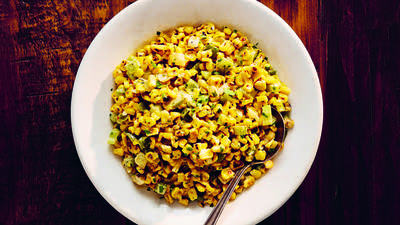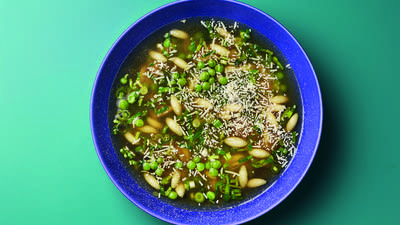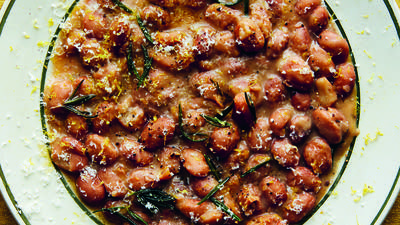Ingredients
Adapted from A New Way to Cook by Sally Schneider.
Serves 4
You can take the basic method of searing meats a step further by using the bits left in the pan as the flavoring to make a rich sauce. Here the infused honey and balsamic vinegar—at once sweet, tart, floral, and herbal—enhance the winy flavor of the duck meat. Curing the duck steaks briefly with salt and sugar ensures that they will be tender. This sauce is also delicious with pork or lamb medallions.
1 1/4 teaspoons kosher salt
1/2 teaspoon coarsely ground black peppercorns
1/4 teaspoon sugar
2 boneless Moulard or Muscovy duck breast halves (3/4 to 1 pound each) or 4 boneless Pekin (Long Island) duck breast halves (about 6 ounces each), skin and fat removed (you can reserve a little fat for cooking the breasts)
3 tablespoons lime blossom, thyme, or wildflower honey
1 tablespoon fresh thyme leaves (and flowers, if possible), plus sprigs for garnish
1 teaspoon reserved duck fat or olive oil
3 tablespoons balsamic vinegar
1/4 cup veal demiglace or 1/2 cup unsalted homemade or canned low-sodium chicken broth, reduced to 1/4 cup
2 teaspoons cold unsalted butter
Kosher salt and freshly ground black pepper
In a small bowl, combine the kosher salt and peppercorns with the sugar. Place the duck breasts on a platter and rub the spice mixture into each one. Cover with plastic wrap and refrigerate for at least 4 hours, or overnight.
About 20 minutes before cooking, remove the duck breasts from the refrigerator to return to room temperature. Pat dry with paper towels. With a paring knife, remove the tenderloin, the thin strip of meat that runs lengthwise down the underside of each breast.
In a small saucepan, combine the honey and thyme leaves and bring to just a simmer over low heat, crushing the leaves with the back of a spoon; set aside to infuse for 5 minutes.
In a heavy medium skillet, heat the duck fat until hot and shimmering. Add the duck breasts and tenderloins and cook until browned and crusty on both sides but still springy to the touch, about 3 to 4 minutes on each side for the Moulard or Muscovy breasts, or 2 to 3 minutes per side for Pekin breasts, about 1 minute per side for the tenderloins. Just before they are done, brush each duck breast with some of the thyme-infused honey and continue to cook until lightly caramelized. Transfer the breasts to a cutting board and let rest for 5 minutes. Discard the fat from the pan.
Add the balsamic vinegar to the pan and stir to loosen the browned bits on the bottom. Boil until the vinegar is very syrupy, about 1 1/2 minutes. Stir in the remaining infused honey and the demiglace and return to a boil. Boil until thick and syrupy, about 1 1/2 minutes longer. Stir in the cold butter and add the salt and pepper to taste.
Using a thin sharp knife, slice each breast on a diagonal 1/8 inch thick. Arrange the slices on four warmed dinner plates. Pour the duck juices left on the cutting board into the pan sauce, strain the sauce over the duck slices, and serve at once.
In Advance: You can marinate the duck breasts up to 1 day ahead.
Instructions
Before you go...
Each week, The Splendid Table brings you stories that expand your world view, inspire you to try something new, and show how food connects us all. We rely on your generous support. For as little as $5 a month, you can have a lasting impact on The Splendid Table. And, when you donate, you’ll join a community of like-minded individuals who love good food, good conversation, and kitchen companionship. Show your love for The Splendid Table with a gift today.
Thank you for your support.
Donate today for as little as $5.00 a month. Your gift only takes a few minutes and has a lasting impact on The Splendid Table and you'll be welcomed into The Splendid Table Co-op.



